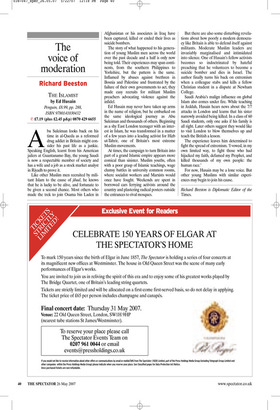The voice of moderation
Richard Beeston
THE ISLAMIST by Ed Husain Penguin, £8.99, pp. 288, ISBN 9780141030432 ✆ £7.19 (plus £2.45 p&p) 0870 429 6655 Abu Suleiman looks back on his time in al-Qaeda as a reformed drug addict in Britain might consider his past life as a junkie. Speaking English, learnt from his American jailers at Guantanamo Bay, the young Saudi is now a respectable member of society and has a wife and a job as a stock market analyst in Riyadh to prove it.
Like other Muslim men recruited by militant Islam to the cause of jihad, he knows that he is lucky to be alive, and fortunate to be given a second chance. Most others who made the trek to join Osama bin Laden in Afghanistan or his associates in Iraq have been captured, killed or ended their lives as suicide bombers.
The story of what happened to his generation of young Muslim men across the world over the past decade and a half is only now being told. Their experiences may span continents, from the southern Philippines to Yorkshire, but the pattern is the same. Inflamed by abuses against brethren in Bosnia and Palestine and frustrated by the failure of their own governments to act, they made easy recruits for militant Muslim preachers advocating violence against the infidel.
Ed Husain may never have taken up arms in the name of religion, but he embarked on the same ideological journey as Abu Suleiman and thousands of others. Beginning as a shy East London teenager with an interest in Islam, he was transformed in a matter of a few years into a leading activist for Hizb ut-Tahrir, one of Britain’s most extreme Muslim movements.
At times, the campaign to turn Britain into part of a grand Islamic empire appears more comical than sinister. Muslim youths, often with a poor grasp of Islamic teachings, wage clumsy battles in university common rooms, where socialist workers and Marxists would once have fought. Weekends are spent in borrowed cars ferrying activists around the country and plastering radical posters outside the entrances to rival mosques. But there are also some disturbing revelations about how poorly a modern democracy like Britain is able to defend itself against militants. Moderate Muslim leaders are invariably marginalised and intimidated into silence. One of Husain’s fellow activists becomes so indoctrinated by hateful preaching that he volunteers to become a suicide bomber and dies in Israel. The author finally turns his back on extremism when a colleague stabs and kills a fellow Christian student in a dispute at Newham College.
Saudi Arabia’s malign influence on global Islam also comes under fire. While teaching in Jeddah, Husain hears news about the 7/7 attacks in London and learns that his sister narrowly avoided being killed. In a class of 60 Saudi students, only one asks if his family is all right. Later others suggest they would like to visit London to blow themselves up and teach the British a lesson.
The experience leaves him determined to fight the spread of extremism. ‘I vowed, in my own limited way, to fight those who had hijacked my faith, defamed my Prophet, and killed thousands of my own people: the human race.’ For now, Husain may be a lone voice. But other young Muslims with similar experiences may begin to join his cause.
Richard Beeston is Diplomatic Editor of the Times.


















































































 Previous page
Previous page